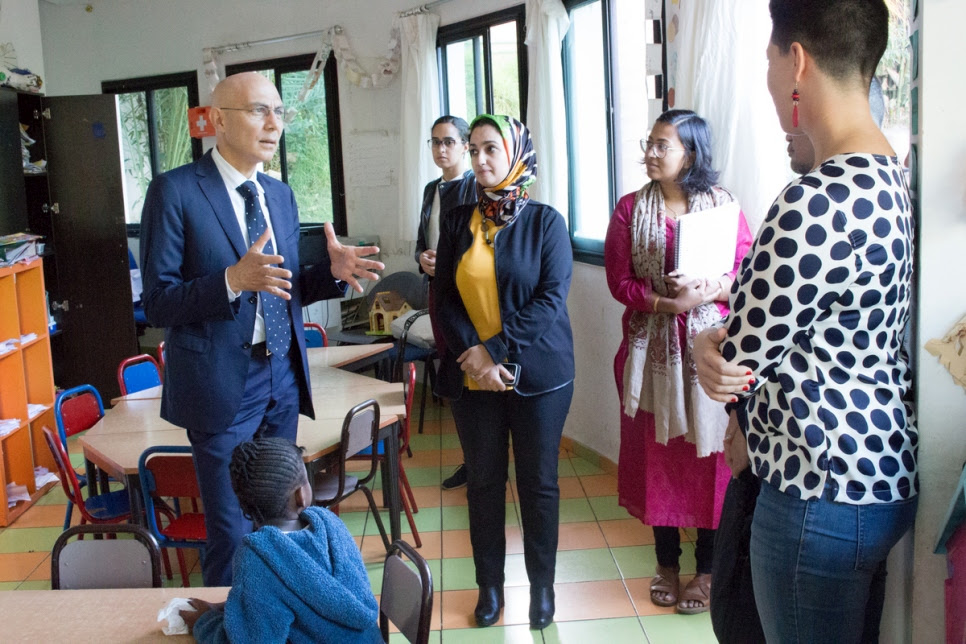UNCHR.org
By Malgorzata Bratkrajc
Français
Volker Türk, UNHCR’s Assistant High Commissioner for Protection, meets with refugees and partners. © UNHCR/Malgorzata Bratkrajc
RABAT, Morocco – UNHCR’s protection chief Volker Türk has praised Morocco for its efforts to protect refugees, on a visit to the capital of Rabat.
Although Morocco remains a transit country for refugees and migrants, it is also fast becoming a country of destination. It works to offer protection to refugees under its National Policy on Immigration and Asylum (NPIA), which was launched in September 2013 under the instructions of King Mohammed VI.
“Morocco is the first country on the African continent having signed the 1951 Geneva Convention,” Türk said in a speech at a gathering of human rights institutions, jointly organized by UNHCR, the National Council for Human Rights in Morocco, the San Remo International Institute of Humanitarian Law and the International Organization for Migration (IOM). “UNHCR is very keen to work closely with the Moroccan authorities, who launched a series of unprecedented policy changes since 2014 for the benefit of refugees.”
“A lot of progress has been made over the last four years.”
Türk’s visit to the Moroccan capital of Rabat coincided with the fourth anniversary of the launch of the country’s National Policy on Immigration and Asylum (NPIA).
“A lot of progress has been made over the last four years,” he told government ministers during his visit. “Yet, to be sustainable, Morocco’s policy now has to be enshrined in a proper normative framework.”
With a national unemployment rate of 9 per cent, Moroccan society is keen to create new jobs. Refugees can make a positive contribution to the job market by creating small enterprises that employ Moroccans.
“It is necessary to invest, sometimes with the help of foreign investors, to create jobs for both refugees and the local population,” said Türk.
“It is important to see refugees as an opportunity and a catalyst for change.”
While in Rabat, Türk visited a small Syrian restaurant owned by Ahmed, a Syrian refugee. Ahmed’s restaurant opened in 2015, with the assistance of UNHCR and its partner AMAPPE (Moroccan Association for the Promotion of Small Enterprises). Now it employs Moroccan nationals alongside Syrian and Palestinian refugees. Ahmed told Türk that he is happy to “give back” to Morocco, the country that welcomed him and his family, by employing nationals. He remains hopeful, however, that he will be able one day to go back home to Syria. “Once peace is back in my country, Syrians will rebuild it in one year,” he said, smiling.
Similar hopes were expressed by Yemeni refugees from three cooperatives that have been launched with the support of UNHCR and AMAPPE. The project was made possible thanks to a law which, after being amended, now allows refugees to create cooperatives in Morocco. “This was not easy,” said the Yemeni entrepreneurs. “But with determination, we succeeded.”
At another meeting with sub-Saharan refugees and asylum-seekers at a community centre run by the Fondation Orient-Occident, UNHCR’s partner in Morocco, people shared their hopes and fears with Türk.
“The purpose of my visit is to listen to refugees and to reiterate to the Moroccan authorities UNHCR’s readiness to continue working with them to make the national asylum policy a success, which can inspire other countries in the region,” Türk said.
“In the beginning, the arrival of refugees can be seen by the society as something new and difficult to manage, especially as regards access to public services, such as healthcare, access to employment, and education. However, it is important to see refugees as an opportunity and a catalyst for change.”








